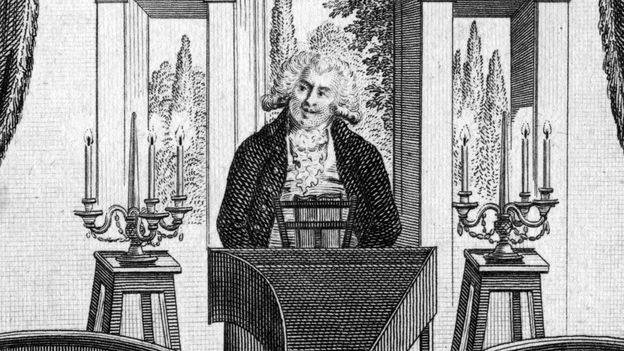think of an era-defining, wildly popular pop star: are you picturing David Bowie? Prince? Elton John? Maybe Taylor Swift, Lady Gaga or Adele? The solo singer-songwriter, whose persona is as well-known as their music and lyrics, is a cornerstone of popular music.
Yet none of those names achieved anything like the domination of arguably Britain's first popular music star: Charles Dibdin. If the name isn't familiar, that's probably because he died in 1814 – although you might recognise the tune of one of his many nautical songs, Tom Bowling, often featured in the UK's popular annual classical concert, Last Night of the Proms.
Yet in his own lifetime – and indeed for half a century after his death – Dibdin was no one-hit wonder, but a hugely prolific, extremely famous figure. He performed in operas and then wrote his own, composed more than a thousand songs, toured one-man shows around the country, and opened his own London theatre. He penned several novels and a five-volume history of theatre. His own autobiography also stretched to four volumes – the largest memoir of the period, and a good indication of Dibdin's remarkable facility for self-promotion.
"He was the most dominant singer-songwriter that Britain has ever had," insists David Chandler, Professor of English Literature at Doshisha University in Kyoto, who has overseen the recent recording of several of Dibdin's shows for CD and digital streaming. "Who is the great British singer-songwriter? Most people are going to choose someone alive or recently deceased – but most of those would have some competition [in their respective eras]. With Dibdin, you just have someone with no obvious rival. Nobody else could combine his performance skills and his musical talents, and his facility for writing lyrics, and his ability to self-publicise, all in one. That's what makes him really unique."
Chandler first became fascinated by Dibdin because, as an academic researching the Romantic era, he kept tripping over Dibdin's name in newspapers. Dibdin clearly had a rather tempestuous nature, and was often getting into financial difficulties, fighting with the critics, and falling out dramatically with other figures in the London theatrical scene – including David Garrick, who exploited Dibdin's musical talents for his Drury Lane theatre in the 1760s and 1770s, when Dibdin was a young man.
Dibdin's reputation as being tricky to work with ultimately led to his staging one-man shows from 1787. He called these innovative, touring performances his "Table Entertainments", and it is a selection of these – alongside The Jubilee, a work written for Garrick's bonanza Shakespeare festival in 1769 – that have lately been performed and recorded by Retrospect Opera, with baritone Simon Butteriss bringing Dibdin back to life.
"Dibdin made enemies, certainly, like a lot of large personalities do. And that's why he ended up having to work on his own," laughs Butteriss. "It was a struggle – he very much had to do everything himself, having been feted at Drury Lane."
The Table Entertainments, however, were a hit. A charming raconteur, Dibdin would play multiple characters, blending comic storytelling with songs played on the piano. In his most successful, titled The Wags, for instance, Dibdin conjures up a villa outside of London – a "camp of pleasure" where English eccentrics eat and drink, tell jokes and stories, and sing songs. First performed in 1790, The Wags was his fourth Table Entertainment, and saw Dibdin "able to refine his product to the point where it had an almost perfect appeal," says Chandler. Dibdin performed it 108 times in its first London season alone – and went on to churn out new Table Entertainments for the next 20 years.




